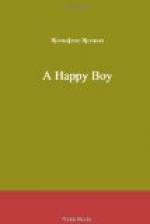“Dance!”
cried the fiddle;
Its strings all
were quaking,
The lensmand’s
son making
Spring up and
say “Ho!”
“Stay!”
called out Ola,
And tripped him
up lightly;
The girls laughed
out brightly,
The lensmand lay
low.
“Hop!” said
then Erik,
His heel upward
flinging;
The beams fell
to ringing,
The walls gave
a shriek.
“Stop!”
shouted Elling,
His collar then
grasping,
And held him up,
gasping:
“Why, you’re
far too weak!”
“Hey!” spoke
up Rasmus,
Fair Randi then
seizing;
“Come, give without
teasing
That kiss.
Oh! you know!”
“Nay!” answered
Randi,
And boxing him
smartly,
Dashed off, crying
tartly:
“Take that now
and go!"[1]
[Footnote 1: Auber Forestier’s translation.]
“Up, youngsters!” cried the school-master; “this is the first day, so you shall be let off early; but first we must say a prayer and sing.”
The whole school was now alive; the little folks jumped down from the benches, ran across the floor and all spoke at once.
“Silence, little gypsies, young rascals, yearlings!—be still and walk nicely across the floor, little children!” said the school-master, and they quietly took their places, after which the school-master stood in front of them and made a short prayer. Then they sang; the school-master started the tune, in a deep bass; all the children, folding their hands, joined in. Oyvind stood at the foot, near the door, with Marit, looking on; they also clasped their hands, but they could not sing.
This was the first day at school.
CHAPTER III.
Oyvind grew and became a clever boy; he was among the first scholars at school, and at home he was faithful in all his tasks. This was because at home he loved his mother and at school the school-master; he saw but little of his father, who was always either off fishing or was attending to the mill, where half the parish had their grinding done.
What had the most influence on his mind in these days was the school-master’s history, which his mother related to him one evening as they sat by the hearth. It sank into his books, it thrust itself beneath every word the school-master spoke, it lurked in the school-room when all was still. It caused him to be obedient and reverent, and to have an easier apprehension as it were of everything that was taught him.
The history ran thus:—




